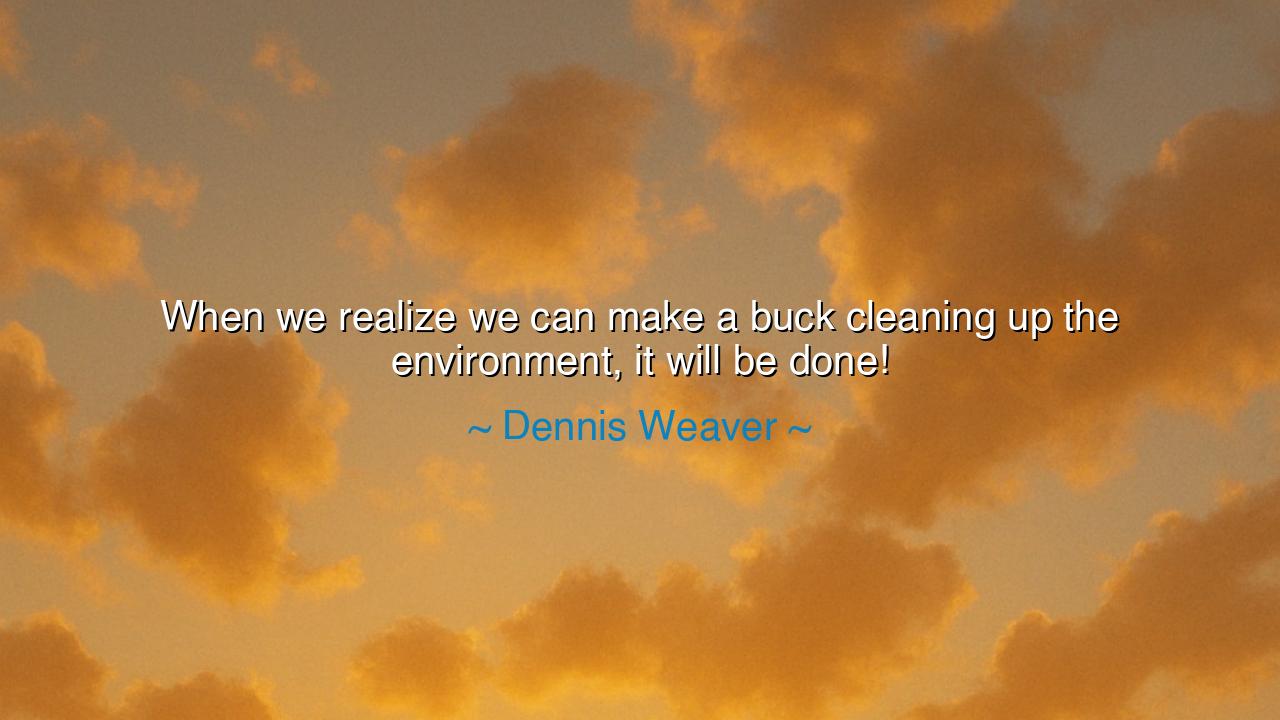
When we realize we can make a buck cleaning up the environment






Hear the flint-spark of plain truth struck against the anvil of commerce: “When we realize we can make a buck cleaning up the environment, it will be done!” In one brisk sentence, Dennis Weaver points to a hinge of human behavior older than empires—the turning of desire toward duty when profit and planet are yoked to the same plow. He does not despise markets; he recruits them. He does not wait for perfect virtue; he harnesses imperfect incentives. For he knows this about our species: we hurry to whatever pays, and what pays soon multiplies.
To make a buck is not, in itself, noble or base; it is a current. Channel it well and it will water gardens; leave it wild and it will flood villages. Weaver’s charge is architectural: build canals where innovation, jobs, and investment flow toward cleaning up the environment—toward energy that spares the sky, materials that circle back, cities that sip rather than gulp. When the ledger smiles at restoration, the boardroom will preach stewardship, and the shop floor will hum like a hive.
Consider a parable from recent history. In the late twentieth century, rain burned lakes and thinned forests—acid rain, born of sulfur from smokestacks. Laws alone had stalled; sermons had tired. Then came an auctioned cap, a tradable permit, a price on the harm. Suddenly, scrubbers were not piety but payback, fuel choices were not politics but arithmetic. Within years, emissions fell, costs ran lower than the prophets of doom had forecast, and a new market—clean air as a commodity—taught an old lesson: align profit with protection, and the work accelerates.
Or look to the rooftops where sun is turned to coin. The family that once saw panels as ornaments now reads them as annuities: lower bills, rising home value, steady returns. Installers hire and train; financiers bundle loans; manufacturers refine glass and cells with priestly care. A thousand livelihoods bloom around the simple equation that daylight, when properly wired, makes a buck. What was once a niche becomes a norm; what was once moral becomes inevitable.
Do not mistake Weaver’s cry for cynicism. He does not say that goodness is nothing without gold; he says that goodness, when it learns the grammar of incentives, speaks a language the whole city understands. We still need conscience, law, and love of children yet unborn; but when markets carry the same banner—when waste has a price and repair has a premium—then the march moves faster, and fewer fall behind. In such a world, a clean river is both sacrament and asset.
Let the lesson be hammered into our daily craft: price the harms we have long hidden; pay for the goods we have long ignored. Build rules that reward durability, recyclability, efficiency. Let public procurement favor low-carbon steel and reclaimed asphalt; let insurance and lending reflect climate risk so capital flows to sturdier shores. Teach entrepreneurs to hunt the frictions of the old order—leaky buildings, idle grids, dirty heat—and turn them into companies that save the world by saving money.
And for each of us, a simple marching plan: (1) Choose products that last and services that repair; extend the life of things until thrift becomes culture. (2) Support policies that put clear prices on pollution and clear rewards on reduction. (3) Invest, where you can, in funds and firms that turn restoration into revenue. (4) At work, count the total cost of ownership—fuel, maintenance, waste—and let that arithmetic guide the greener choice. Do these things steadily, and Weaver’s promise will unfold before your eyes: the day we recognize that we can make a buck cleaning up the environment, the machine of the world will lean its strength toward healing—and it will be done.






AAdministratorAdministrator
Welcome, honored guests. Please leave a comment, we will respond soon